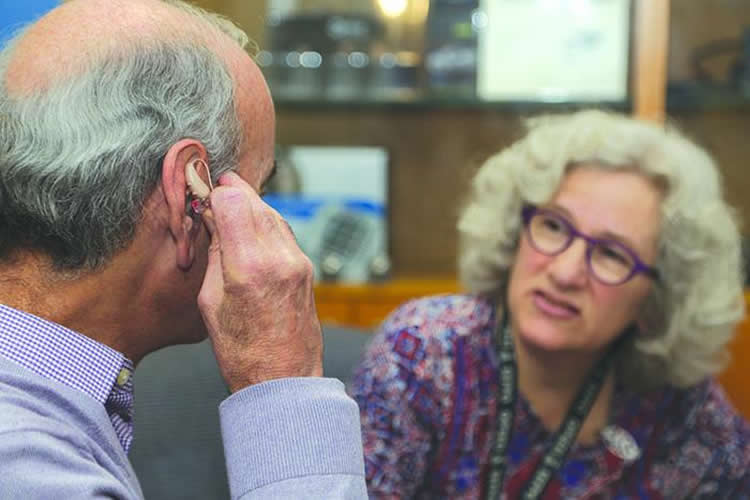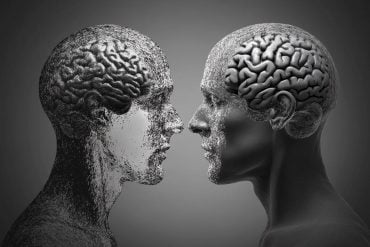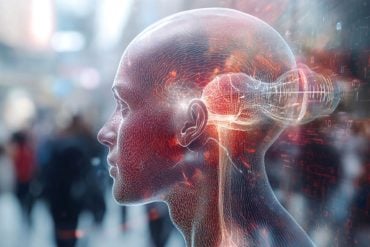Summary: Researchers report signs of memory problems in old age may be a result of hearing loss and not a neurodegenerative disease.
Source: Baycrest Center for Geriatric Care.
What might appear to be signs of memory loss could actually point to hearing issues, says Dr. Susan Vandermorris, one of the study’s authors and a clinical neuropsychologist at Baycrest.
A recent Baycrest study, published in the Canadian Journal on Aging, found that the majority (56 per cent) of participants being evaluated for memory and thinking concerns and potential brain disorders had some form of mild to severe hearing loss, but only about 20 per cent of individuals used hearing aids. Among the participants, a quarter of them did not show any signs of memory loss due to a brain disorder.
“We commonly see clients who are worried about Alzheimer’s disease because their partner complains that they don’t seem to pay attention, they don’t seem to listen or they don’t remember what is said to them,” says Dr. Vandermorris. “Sometimes addressing hearing loss may mitigate or fix what looks like a memory issue. An individual isn’t going to remember something said to them if they didn’t hear it properly.”
Hearing loss is the third most common chronic health condition in older adults, which is experienced by 50 per cent of individuals over the age of 65 and 90 per cent of people over the age of 80. It takes an average of 10 years before people seek treatment and less than 25 per cent of individuals who need hearing aids will buy them.
Hearing status is not always addressed in neuropsychology clinics, but can impact performance on memory assessments done verbally, adds Dr. Vandermorris.
“Some people may be reluctant to address hearing loss, but they need to be aware that hearing health is brain health and help is available,” she adds.
The study analyzed results from 20 individuals who were receiving a neuropsychological assessment at Baycrest. Participants completed a hearing screening test after their cognitive evaluation.
Neuropsychologists were privy to hearing test results after their initial assessment, which altered some of their recommendations. For example, some clients were referred to a hearing clinic for a full audiology assessment or to consider using a hearing aid, as well as provided education on hearing loss and communication.
“Since hearing loss has been identified as a leading, potentially modifiable risk factor for dementia, treating it may be one way people can reduce the risk,” says Marilyn Reed, another author on the study and practice advisor with Baycrest’s audiology department. “People who can’t hear well have difficulty communicating and tend to withdraw from social activities as a way of coping. This can lead to isolation and loneliness, which can impact cognitive, physical and mental health.”
This study builds on earlier research that analyzed how addressing memory problems could benefit older adults seeking hearing loss treatment.
“We are starting to learn more about the important role hearing plays in the brain health of our aging population,” says Dr. Kate Dupuis, lead author on the study, a former postdoctoral fellow at Baycrest, clinical neuropsychologist and Schlegel Innovation Leader at the Sheridan Centre for Elder Research. “In order to provide the best care to our older clients, it is imperative that neuropsychologists and hearing care professionals work together to address the common occurrence of both cognitive and hearing loss in individuals.”

Since the studies, Baycrest’s Neuropsychology and Cognitive Health Program and Hearing Services have incorporated general screening for hearing and memory issues into their assessments, as well as provided educational materials to clients.
Next steps for the study will involve optimizing screening strategies for hearing loss in memory assessments and ongoing interprofessional collaborations to create educational tools that counsel clients about the relationship between hearing, memory and brain health.
Funding: The study was made possible with support from the neuropsychology and cognitive health and audiology programs at Baycrest. The research team included Iris Yusupov, Dr. Kelly Murphy, Dr. Dmytro Rewilak and Dr. Kathryn Stokes.
Source: Michelle Petch Gotuzzo – Baycrest Center for Geriatric Care
Publisher: Organized by NeuroscienceNews.com.
Image Source: NeuroscienceNews.com image is credited to Baycrest.
Original Research: Abstract for “Considering Age-Related Hearing Loss in Neuropsychological Practice: Findings from a Feasibility Study”by Kate Dupuis, Iris Yusupov, Susan Vandermorris, Kelly L. Murphy, Dmytro Rewilak, Kathryn A. Stokes and Marilyn Reed in Canadian Journal on Aging. Published December 7 2018.
doi:10.1017/S0714980818000557
[cbtabs][cbtab title=”MLA”]Baycrest Center for Geriatric Care”Signs of Memory Problems May Instead Be Symptoms of Hearing Loss.” NeuroscienceNews. NeuroscienceNews, 21 January 2019.
<https://neurosciencenews.com/hearing-memory-10606/>.[/cbtab][cbtab title=”APA”]Baycrest Center for Geriatric Care(2019, January 21). Signs of Memory Problems May Instead Be Symptoms of Hearing Loss. NeuroscienceNews. Retrieved January 21, 2019 from https://neurosciencenews.com/hearing-memory-10606/[/cbtab][cbtab title=”Chicago”]Baycrest Center for Geriatric Care”Signs of Memory Problems May Instead Be Symptoms of Hearing Loss.” https://neurosciencenews.com/hearing-memory-10606/ (accessed January 21, 2019).[/cbtab][/cbtabs]
Abstract
Considering Age-Related Hearing Loss in Neuropsychological Practice: Findings from a Feasibility Study
Hearing loss is highly prevalent in older adults and can pose challenges for neuropsychologists, as assessment and intervention procedures often involve orally presented information which must be accurately heard. This project examined the hearing status of 20 clients (mean age = 71 years) in a hospital-based outpatient neuropsychology clinic, and explored whether information about hearing loss informed neuropsychologists’ clinical practice. A research assistant administered a brief hearing screening test to each participant. Four treating neuropsychologists were asked to comment on their client’s hearing status before and after being shown their client’s hearing screen test results. Screening revealed that the majority of participants had at least mild hearing loss, and that the neuropsychologists were relatively accurate (60%) at estimating their clients’ hearing status. Neuropsychologists used information about a client’s hearing status to make recommendations that clients pursue audiologic services, and to educate clients and family members about hearing loss and communication.







